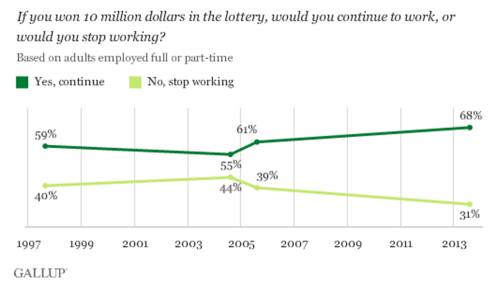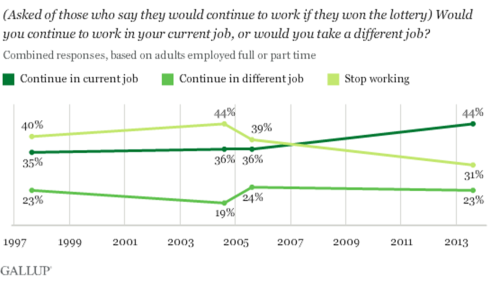When Gallup released the most recent State of the American Workforce Report, the engagement news was not good.
Here’s what the report said:
Currently, 30 percent of the U.S. workforce is engaged in their work, and the ratio of engaged to actively disengaged employees is roughly 2-to-1, meaning that the vast majority of U.S. workers (70 percent) are not reaching their full potential — a problem that has significant implications for the economy and the individual performance of American companies.”
Because the basic premise is that organizations with highly engaged workforces produce better results than those with less engaged workforces, I was surprised that the press didn’t make more of this data. I wrote about it here, but it was about creating the business case for caring about whether or not employees are or are not engaged.
Is engagement what we should be measuring?
I guess the overall sad state of engagement in the U.S. is a given and not newsworthy anymore.
But I saw some new Gallup survey data that, frankly, raises new questions for me, and makes me wonder if “engagement” is really what we should be measuring. And, if “engagement” and stronger financial performance really are causal, as Gallup implies.
The survey question was “If you won $10 million in the lottery, would you continue to work, or would you stop working?” So a rational person might think, “Well, if 30 percent of the workforce is engaged and 70 percent of the workforce is not engaged, then probably 70 percent of the workforce would quit their jobs if they found themselves $10 million richer.”
Wouldn’t you think that? I certainly did.
The opposite of what you might have expected
So imagine my surprise to see that the response to this survey question is exactly the opposite of what we would have expected! Some 68 percent of polled working adults said they’d keep working and 31 percent said they would quit. Exactly the opposite!
I’m confused. But then I thought I had it figured out when I looked at the next question, which asked those who said they’d continue working if they’d stay in the same job or take a different job.
“A-ha!” I thought to myself. “The people who said they’d continue to work would surely take another job – a job in an organization that would be more engaging since they’re all not engaged.” But no. Nearly half of those said they’d even stay in the same job!
Workers want to stay put
Now I’m really confused. Maybe it’s financial, except that the positive trajectory to stay in the same job started way before the recession of 2009.
So it may not be financially motivated. In fact, $10 million buys a lot less in 2013 than it did in 2005 – and still the percentage of workers saying they’d stay in the same job has grown substantially.
So what’s the deal? Does engagement even matter? If 67 percent of the population will continue to work after winning $10 million – and fully half of those will stay in the job they currently have — why do we care about engagement scores?
Does engagement really matter? Enquiring minds want to know!
This originally appeared on China Gorman’s blog at ChinaGorman.com.
